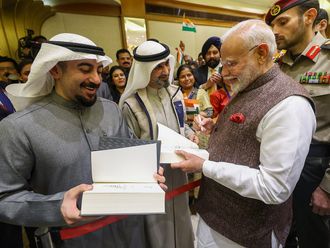Manama: Kuwait’s Constitutional Court has dismissed a petition calling for the dissolution of the parliament elected on the one-voter, one-vote principle.
The court also rejected five petitions challenging results in the parliamentary by-elections held this year.
In his petition to the court, Salah Al Hashem, a lawyer, complained of faulty procedures and said that the one-vote decree was issued as the parliament was in recess.
The Emir Shaikh Sabah Al Ahmad issued the decree in October 2012, slashing the number of ballots a voter could cast from four to one.
Supporters said that the new one voter, one vote system was the international standard and that it would put an end to vote-buying and clan-run political blocs.
However, members of the opposition have been pushing for its abolition, saying that it was meant to reduce its influence and to ensure the election of a rubber-stamp parliament.
The Constitutional Court in June last year upheld the decree.
However, Al Hashem filed a new petition, arguing that said the Emiri decree was not in line with the constitution.
The court decision on Wednesday was received with great relief by lawmakers who had long insisted that the parliament would not be dissolved and that it would last its four-year term.
Hours before the court issued its verdict, rumours spread on social networks claiming that the country’s highest court had decided to dissolve the parliament.
Parliament Speaker Marzooq Al Gahnem welcomed the verdict, saying that the decisions by the Constitutional Court have always been respected.
“The decisions must be upheld by all those who believe in the state of constitution and laws,” he said. “They are the final say in any constitutional dispute or divergences and we all have to respect them regardless of our political views and orientations,” he said.
MP Ahmad Larri urged all Kuwaitis to build on the court’s decision and work together for the sake of the nation.
“Political activism is not confined to parliament and all those who can serve Kuwait should not hesitate to move forward thanks to an active civil society,” he said. “We now hope for further stability and development, particularly that the people look forward to the parliament sitting through its legislative term until 1917,” he said.











